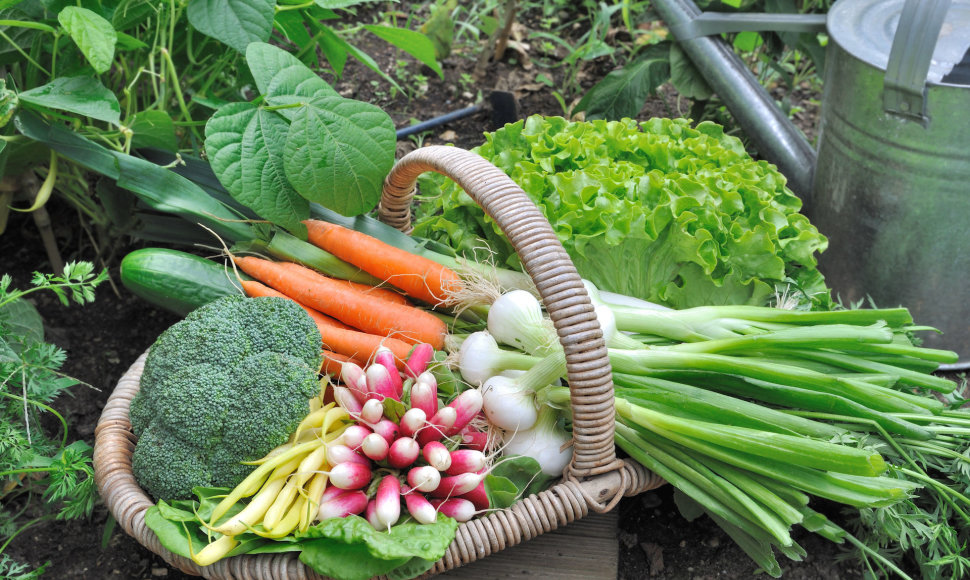“The produce grown by Lithuanian farmers is valued far more by the country’s citizens than that grown abroad. The absolute majority of citizens are convinced that produce grown in Lithuania is safe to consume, has more vitamins and minerals, and is grown using fewer crop protection chemicals and fertilisers than in other countries. That said, while the quality is highly rated, local produce has been labelled as “expensive.” Lithuanians think that Lithuanian-grown produce is more expensive than that grown in Finland,” the head of LAAA/LCPA Zita Varanavičienė commented on the survey results.
Most important – price, looks, and Lithuanian origins
According to the study, the three most important criteria while buying vegetables, fruits, and grains for one’s family are the price (important to 72% of respondents); a good, healthy look (58%), and that the produce is grown in Lithuania (52%).
For example, when choosing between equally priced apples, an entire 67% of residents would choose one grown in Lithuania. Meanwhile, while choosing tomatoes in March, Lithuanians would have also been more inclined to choose Lithuanian and not Spanish ones, even though it seems conditions to grow them are less favourable in Lithuania. Furthermore, one of every three Lithuanians is inclined to pay more for Lithuanian-grown produce.
The Lithuanian origin of produce is particularly important to older respondents. Meanwhile, youths often mentioned that while choosing fruits and vegetables, they are also concerned with the appearance of produce being ripe and clean.
“Based on the survey, we can see that people care about looks. They would be more inclined to choose washed carrots than unwashed ones or firm strawberries rather than ones with softened spots, which could go bad within a day. This shows an expectation for farmers to offer healthy, good looking produce. While concurrently ensuring they look natural – carrots in different sizes and varied apples look better to consumers than ones of identical size with glossy peels,” Z. Varanavičienė commented on the survey data.
Efficiency could increase
While citizens like and choose Lithuanian produce, few of them think the country’s farmers work particularly effectively.
“Indeed, we should encourage sustainable farming. It is held to be sustainable when it can ensure safe food for a reasonable price while conserving natural resources and maintaining operational profitability. This is a matter of coordinating economic, social, and environmental interests, which farms can achieve by employing technologies, leveraging science, applying targeted farming methods – fertilising based on soil studies, and using protective products only to the extent they are needed. Growing affordable produce and effective farming are useful from all perspectives,” Z. Varanavičienė noted.
She adds that ecological farming isn’t necessarily sustainable. For example, in ecological farms, more C02 is released per kilogram of food grown, worked land is wasted if the yield is small and thus not harvested, and so on.
The customers’ greatest fears – how justified are they?
According to the survey results, more than half – 54% – of Lithuanians understand that in order to farm efficiently, plant fertilisation and spraying are essential. Most also think that there is nothing bad about fertilising plants to the extent that scientific norms allow and when usage conforms to regulations because this is plants’ food and medicine.
That said, while they are aware of the necessity of efficiency, consumers do have certain concerns. They are most concerned about pesticide, nitrate, and chemical residues in produce, as well as the use of genetically modified seeds and growth-stimulating materials.
“Most of the fears consumers have are unfounded. The EU has the strictest plant protection product evaluation and market supply requirements in the world, and the produce grown in the EU’s farms is safe for consumers,” Z. Varanavičienė says.
She quotes data from the latest European Food Safety Agency (EFSA) pesticide monitoring programme. Based on this programme, more than 96 thousand samples were taken across all EU countries, Iceland, and Norway, and it was found that 96.1% of produce is safe, with pesticide residue not exceeding established norms.
For comparison, test results for food produce imported from third countries are far worse. Over 15% of samples from produce originating in Laos, Malaysia, Ghana, Uganda, Vietnam, Pakistan, Thailand, and Cambodia exceeded the largest permitted concentration. The absolute worst offender proved to be chilli peppers from Vietnam (67% of samples were contaminated).
“We can take even greater pride in Lithuanian farms, with their produce being even safer. According to the European study, an entire 98.3% of produce grown in our country is safe, and only 1.7% of samples exceeded the norm of pesticide concentration,” Z. Varanavičienė says.
Pesticide residue from ecological farms indicates illegal activities
Curiously, the percentage of contaminated samples from Lithuanian farms was similar to that of ecological farms across the EU. Certain pesticides shouldn’t be used at all, with 1.3% of their samples being contaminated in excess of permitted pesticide concentrations. Furthermore, pesticide residue (not necessarily above the norm) was found in 13.1% of samples from ecological farms, including some cases of entirely prohibited pesticides in the EU.
“This reveals certain illegal activities and a black market, and so state actions on such decisions are essential,” Z. Varanavičienė stated.
The Lithuanian Crop Protection Association commissioned a public opinion survey performed in May-June this year by KOG Institutas. During the survey, 1002 respondents aged 18 and older were interviewed across Lithuania.












